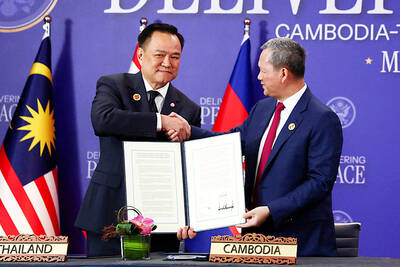North Korea pressed South Korea yesterday to discuss redrawing their disputed sea border, the scene of bloody clashes in the past, as the two sides began high-level military talks on easing tensions.
The three-day talks at the frontier village of Panmunjom in the Demilitarized Zone come amid a general improvement in relations, after the North shut down nuclear facilities which had produced bomb-making plutonium.
But the North stuck to its earlier demands for a new border in the Yellow Sea, something Seoul rejects. The North refuses to recognize the Northern Limit Line drawn up by UN forces at the end of the 1950-1953 Korean War.
"The North said the issue needs to be discussed. We stressed again that our position on the Northern Limit Line in the West [Yellow] Sea is firm," said Colonel Moon Seong-mook, spokesman for the South Korean delegation, while briefing reporters after the first day.
Six South Koreans were killed in a clash in June 2002 in the area, while in June 1999 a similar skirmish killed dozens of North Korean sailors.
The North says South Korean warships continue to fuel tension by violating its waters in the area, accusations rejected by Seoul as groundless.
Moon said the three hours of talks focused on ways to prevent clashes, a possible joint fishing area, providing military security guarantees for cross-border railways and highways, and other economic cooperation projects.
Trains from the two countries crossed the heavily fortified border on May 17 on test runs. The South wants a regular service to cater to growing economic links, but the North has been unwilling to extend safety guarantees.
North Korea has proposed creating a joint fishing zone in rich crab-fishing grounds south of the Northern Limit Line, while South Korea wants the zone to be established along the line.
A previous round of general-level talks ended fruitlessly in May because of the sea border dispute. Moon described the mood yesterday as "not bad."
The North is also demanding that its cargo ships be allowed to take a short cut home across the sea border and wants joint development around the mouths of cross-border rivers.

Shamans in Peru on Monday gathered for an annual New Year’s ritual where they made predictions for the year to come, including illness for US President Donald Trump and the downfall of Venezuelan President Nicolas Maduro. “The United States should prepare itself because Donald Trump will fall seriously ill,” Juan de Dios Garcia proclaimed as he gathered with other shamans on a beach in southern Lima, dressed in traditional Andean ponchos and headdresses, and sprinkling flowers on the sand. The shamans carried large posters of world leaders, over which they crossed swords and burned incense, some of which they stomped on. In this

‘NO COUNTRY BUMPKIN’: The judge rejected arguments that former prime minister Najib Razak was an unwitting victim, saying Najib took steps to protect his position Imprisoned former Malaysian prime minister Najib Razak was yesterday convicted, following a corruption trial tied to multibillion-dollar looting of the 1Malaysia Development Berhad (1MDB) state investment fund. The nation’s high court found Najib, 72, guilty on four counts of abuse of power and 21 charges of money laundering related to more than US$700 million channeled into his personal bank accounts from the 1MDB fund. Najib denied any wrongdoing, and maintained the funds were a political donation from Saudi Arabia and that he had been misled by rogue financiers led by businessman Low Taek Jho. Low, thought to be the scandal’s mastermind, remains

Near the entrance to the Panama Canal, a monument to China’s contributions to the interoceanic waterway was torn down on Saturday night by order of local authorities. The move comes as US President Donald Trump has made threats in the past few months to retake control of the canal, claiming Beijing has too much influence in its operations. In a surprising move that has been criticized by leaders in Panama and China, the mayor’s office of the locality of Arraijan ordered the demolition of the monument built in 2004 to symbolize friendship between the countries. The mayor’s office said in

FIGHTING CONTINUES: Thai military dropped 40 bombs on border areas, Cambodia said, while Bangkok said Phnom Penh launched heavy attacks and damaged homes Cambodia yesterday accused Thailand of intensifying its bombardment of disputed border areas, even as officials from the two countries attend a multi-day meeting aimed at negotiating an end to deadly clashes. The neighbors’ long-standing border conflict reignited this month, shattering an earlier truce and killing more than 40 people, according to official counts. About 1 million people have also been displaced. Cambodian and Thai officials were in their third day of talks at a border checkpoint, with ministers of defense from the two countries scheduled to meet today. However, the Cambodian Ministry of National Defense said Thailand’s military carried out a heavy